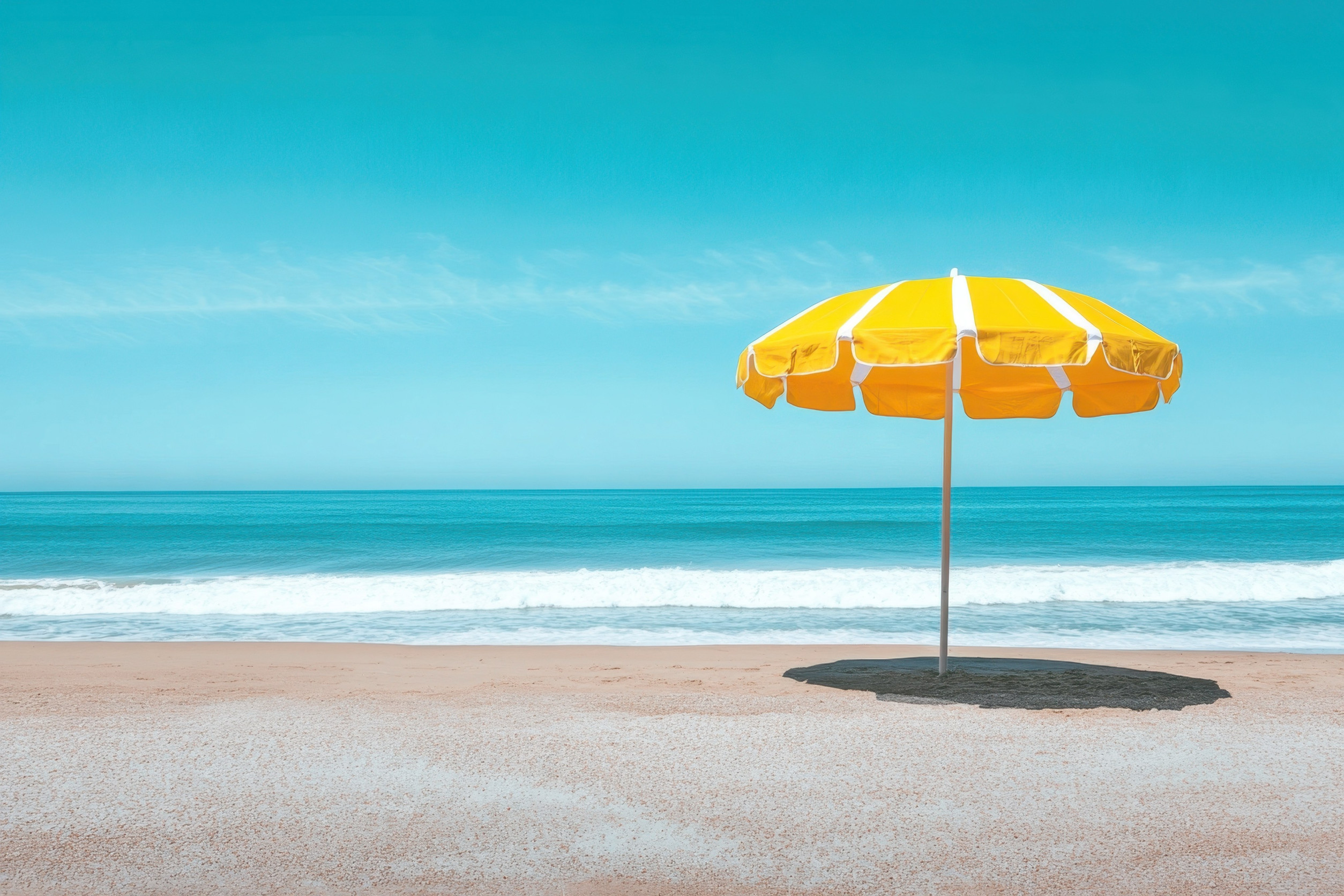 Image Source: Yuriy Nedopekin; “A yellow striped umbrella provides shade on a tranquil beach.”, 2025. Accessed via Standard License.
Image Source: Yuriy Nedopekin; “A yellow striped umbrella provides shade on a tranquil beach.”, 2025. Accessed via Standard License.With the summer solstice marking the official start of beach season, millions of people are preparing to enjoy sandy shores, refreshing waters, and warm sunshine. Whether you’re planning a family vacation at a beach resort or spending a day at your local coastline, understanding proper beach etiquette ensures everyone can enjoy their time by the water. From respecting personal space to protecting our marine environment, following these essential guidelines will help create a pleasant experience for all beachgoers.
Respect Personal Space and Beach Territory
One of the most important aspects of beach etiquette involves respecting other people’s space. When choosing your spot on the sand, avoid setting up too close to other beachgoers unless the beach is particularly crowded. A good rule of thumb is to maintain at least 10 feet of distance when possible. This gives families and groups room to spread out, play games, and relax without feeling cramped.
Be mindful of where you place your umbrella, tent, or beach chair. Avoid blocking other people’s ocean views or creating obstacles in high-traffic walking areas. If you need to walk through someone’s established beach area, politely ask for permission or walk around their space when feasible.
Mind Your Music and Noise Levels
While upbeat music can enhance your beach experience, remember that not everyone shares your musical preferences. Keep your music at a reasonable volume that doesn’t disturb neighboring beachgoers. Consider using headphones or portable speakers with directional sound to minimize noise pollution. This is especially important during early morning and evening hours when people may be seeking peace and relaxation.
Similarly, be conscious of your conversation volume, especially when discussing personal matters. The beach’s open environment carries sound farther than you might expect.
Practice Proper Beach Safety Etiquette
Safety should always be your top priority at the beach. Follow all posted signs and lifeguard instructions without question. If lifeguards are on duty, swim only in designated areas and pay attention to flag systems that indicate water conditions. Never ignore warning flags or swim in areas marked as dangerous.
When engaging in beach sports like volleyball, frisbee, or football, be aware of your surroundings and other beachgoers. Keep active games away from crowded areas and always watch for people who might wander into your playing space. If your ball or frisbee lands near other people, politely retrieve it and apologize for any inconvenience.
Children should be supervised at all times, ensuring they understand basic beach safety rules and respect for others. Teach children not to run through other people’s beach setups or disturb sandcastles and beach structures built by other families.
Many beaches have specific rules about smoking and alcohol consumption. Before lighting up or opening a beverage, check local regulations and posted signs. If alcohol is allowed, consume responsibly and never leave empty containers on the beach. Excessive drinking can impair judgment and create safety hazards, especially around water.
Environmental Responsibility and Conservation
Protecting our beaches and marine ecosystems is everyone’s responsibility. Always clean up after yourself by packing up everything you brought to the beach. This includes food wrappers, bottles and cans, cigarette butts, and any other trash. Many beaches provide recycling bins, so use them appropriately to help reduce environmental impact.
Avoid disturbing local wildlife, including birds, crabs, and other marine creatures. Never feed wild animals, as this can disrupt their natural behavior and diet. If you encounter nesting areas for sea turtles or birds, give them a wide berth and follow all posted guidelines for protecting these sensitive areas.
When exploring tide pools or rocky areas, look but don’t take. Shells, rocks, and other natural items should remain in their natural environment for others to enjoy and for the ecosystem to function properly. Use reef-safe sunscreen to protect coral reefs and marine life from harmful chemicals.
Creating Positive Beach Memories
The beach should be a place where everyone can create wonderful memories with family and friends. By following these etiquette guidelines, you contribute to a positive environment that allows all visitors to enjoy the natural beauty and recreational opportunities our coastlines provide. Courtesy, respect, and environmental consciousness are the foundations of good beach behavior.
This summer, commit to be a responsible beachgoer who enhances rather than detracts from the beach experience. Your consideration for others and the environment ensures these beautiful coastal spaces remain enjoyable for generations to come.
You may also enjoy reading . . .


